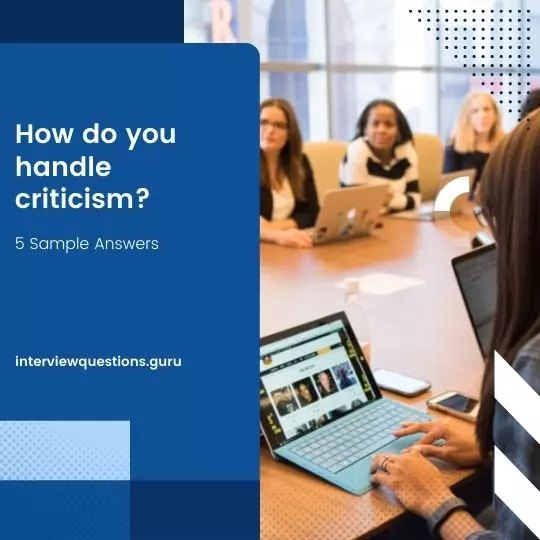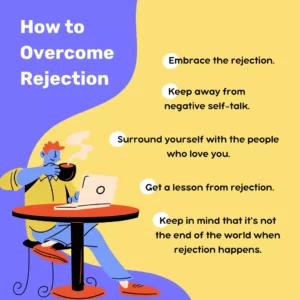How do you handle criticism? criticism can be tough to handle, especially if directed at you. However, with the right attitude and approach, you can turn criticism into a learning experience that will make you stronger and better as a person. This blog post will provide a sample answer to “how do you handle criticism?” We hope that this answer will help you deal with criticism positively and productively.

Table of Contents
Why did the interviewer ask how do you handle criticism?
This is one of the most common interview questions. The interviewer wants to know how you deal with negative feedback and respond when things don’t go your way. They are also looking to see how well you can take constructive criticism.
How to answer the interview question “how do you handle criticism?”
One of the most important skills in the workplace is the ability to take criticism gracefully. Whether it’s feedback from a boss or a client, being able to hear negative comments and use them to improve your work is essential. Try following these steps the next time you’re in an interview and asked how you handle criticism.
Steps to handle criticism at work or any other place
- Listen to what the other person has to say. Don’t interrupt, and try to listen objectively.
- Don’t take the criticism personally. Remember that the other person is just giving their opinion, and they are not trying to hurt your feelings.
- Thank the other person for their feedback. Even if you don’t agree with it, thank them for taking the time to share their thoughts with you.
- Use the criticism to improve yourself. If you can learn from the criticism and make changes, you will be stronger and better in the future.
The best way to handle criticism is to take a step back and assess the situation. What specifically bothered you about the feedback? Sometimes, it’s not what the person said but how they said it that makes us upset. Try to put yourself in the other person’s shoes. Why did they give you this feedback? What do they want you to do differently?
Now, there will be times when the criticism is unfair or inaccurate. In those cases, it’s important to stay calm and collected. Politely let the other person know that you heard them but disagree with what they said. Explain your reasoning and try to come to a resolution. If it can’t be resolved, agree to disagree and move on.

How do you handle criticism? Sample Answers
Sample Answer 1
When criticized, always take the time to listen and understand the other person’s perspective. In this situation, my colleague was not pleased that I had told management about her project without asking her permission. I apologized to her and explained that I had had no ill intentions.
The next time she mentioned a Young Professionals project to me, I made sure to ask her permission before telling anyone else. This showed my colleague that I respected her and her project. She was pleased when I asked her permission and even invited me to join her in helping achieve the new project’s objectives. Handling criticism like this can helps to build better relationships with the people around you.
Sample Answer 2
Criticism can be tough to swallow, but it’s important always to take the high road and stay respectful. In my experience, if you can remain calm and collected, the other person is more likely to listen to your side of things. No one is perfect, so it’s important to be able to learn from our mistakes.
Sample Answer 3
No one enjoys being criticized, but it is an unavoidable part of life. The key to dealing with criticism is not to take it personally. It is important to remember that criticism is usually based on the critic’s own opinion and perspective and does not necessarily reflect your own worth or character.
It can be helpful to try to see the criticism as constructive feedback that can help you improve. If the criticism is unfair or unjustified, it is best just to ignore it. The most important thing is not to let criticism get you down or discourage you from pursuing your goals.
Sample Answer 4
I am always striving to improve my work, and I welcome constructive criticism from my colleagues. Recently, I was working on a project that was very important to me, and I put a lot of effort into it. Unfortunately, it wasn’t received as well as I had hoped. My boss pointed out a few areas that needed improvement, and while it was difficult to hear, I knew she was right.
I went back to the drawing board and made the necessary changes. The revised project was much better received, and I learned an important lesson about how to handle criticism.
Sample Answer 5
I remember the first time my boss criticizes me in front of the whole team. I was so embarrassed and angry. I wanted to prove her wrong and show her that I could do the job. After the meeting, I went back to my desk and made a list of all the areas I needed to improve. I started working on those areas, and within a few weeks, I could see the difference in my work.
My boss noticed too, and she praised me in front of the team. That experience taught me that criticism could be a good thing if you use it to improve yourself. Whenever I receive criticism, I try to take it as constructive feedback and use it to learn and grow.
Conclusion
No one is perfect, and that includes you. Handling criticism with grace and understanding will show employers that you can handle difficult situations.
When you can take negative feedback in stride, it proves that you are resilient and can handle setbacks. So, how do you handle criticism? Remember to stay calm, and be respectful.
We hope now you know how to answer this interview question and deal with criticism in a constructive way. Do you have any other techniques that have worked for you? Please share them in the comments below.